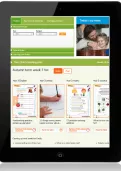Important update from TheSchoolRun
For the past 13 years, TheSchoolRun has been run by a small team of mums working from home, dedicated to providing quality educational resources to primary school parents. Unfortunately, rising supplier costs and falling revenue have made it impossible for us to continue operating, and we’ve had to make the difficult decision to close. The good news: We’ve arranged for another educational provider to take over many of our resources. These will be hosted on a new portal, where the content will be updated and expanded to support your child’s learning.
What this means for subscribers:
- Your subscription is still active, and for now, you can keep using the website as normal — just log in with your usual details to access all our articles and resources*.
- In a few months, all resources will move to the new portal. You’ll continue to have access there until your subscription ends. We’ll send you full details nearer the time.
- As a thank you for your support, we’ll also be sending you 16 primary school eBooks (worth £108.84) to download and keep.
A few changes to be aware of:
- The Learning Journey weekly email has ended, but your child’s plan will still be updated on your dashboard each Monday. Just log in to see the recommended worksheets.
- The 11+ weekly emails have now ended. We sent you all the remaining emails in the series at the end of March — please check your inbox (and spam folder) if you haven’t seen them. You can also follow the full programme here: 11+ Learning Journey.
If you have any questions, please contact us at [email protected]. Thank you for being part of our journey it’s been a privilege to support your family’s learning.
*If you need to reset your password, it will still work as usual. Please check your spam folder if the reset email doesn’t appear in your inbox.
How a SENCO could help your child

What is a SENCO?
A SENCO (Special Educational Needs Coordinator) is a teacher who coordinates the provision for children with special educational needs or disabilities in schools. Many are also class teachers, and fulfil their SENCO duties on a part-time basis. SENCOs who were in position before 2009 may have been trained on the job, but now all new SENCOs have to complete a Masters level National Award for Special Educational Needs. So how could a SENCO help your child?
1. Assessing your child
‘If either you or the teacher has a concern about your child, the SENCO will go into the class to observe them and advise on what the next steps should be in terms of whether support is needed, and what that might involve,’ explains Carmel McDermott, SEN parent adviser at Contact a Family (helpline 0808 808 3555). The SENCO is there to work not just with children who have physical or learning difficulties, but also those with emotional or behavioural problems, or who need some short-term support, for example in coping with a bereavement.


Boost Your Child's Maths & English Skills!
- Get a tailored learning plan for your child
- Complete the activities added each week
- See your child jump ahead in their knowledge and confidence
2. Referring your child to a professional
If the SENCO feels your child would benefit from external support, she can make a referral to professionals such as a speech and language therapist or occupational therapist. ‘She will also be involved in meetings with these professionals, both during the diagnostic process and on an on-going basis,’ adds Carmel.
3. Arranging SEN support in school
'Once a child’s concerns have been identified, the SENCO, in consultation with the class teacher, should put together an individual SEN support plan which should then be shared with the parents,’ says Carmel. This sets out your child’s learning targets, who will support him or her and how, what resources and methods will be used, how your child’s progress and achievements will be monitored and how you can help as a parent.
4. Helping with an EHC procss
Either you or the school may request an Education, Health and Care needs assessment for your child. This is a detailed investigation into your child’s special educational needs and is carried out by the local authority. If the local authority decides that the school can’t meet your child’s needs from its own resources, your child will be given an Education, Health and Care Plan (EHCP) which sets out your child’s needs and what additional help they require.
‘During the assessment process, the local authority will ask the parents, the school and any professionals involved to produce a report about the child’s difficulties, and in most cases, the SENCO will write the report on behalf of the school,’ Carmel explains. ‘She will also be involved in explaining the process to you and liaising with you throughout.’
5. Helping the teacher to help your child
The SENCO plays a vital role in supporting your child’s teacher to ensure that their educational needs are met. ‘The SENCO will often help the teacher with their planning to ensure that the teaching is accessible to your child, give advice on how they can improve their practices and suggest resources and activities that could support their learning,’ says Carmel. ‘The SENCO can also deliver additional training to teachers, or arrange external training if appropriate.’
6. Co-ordinating meetings
Many people are involved in the education and support of a child with special educational needs: the class teacher, the SENCO, parents and other professionals. ‘The SENCO should be involved in any meetings with these people to ensure that everyone is coordinated in how they support the child,’ Carmel says.
7. Organising resources
For some children with special educational needs, resources – ranging from flashcards to laptops – can make a big difference to their learning. ‘The SENCO will be involved in the provision of those resources, and will liaise with the necessary people if there’s a financial implication,’ Carmel explains.
8. Reviewing targets
‘A child’s SEN support plan should contain SMART targets that are specific, measurable, achievable, realistic and time sensitive,’ says Carmel. ‘These targets should be reviewed regularly in a meeting with the SENCO, teacher, parents and professionals, usually once a term.’
9. Being an advocate
Having a child with special needs can be highly emotive, and feelings often run high if things are going badly at school. Remember, the SENCO is there to support you and your child, and to be an advocate for you both. ‘If something is niggling, it’s always best to talk to the SENCO sooner rather than later,’ adds Carmel.
Read our parents' guide to building a great working relationship with your child's SENCO.








